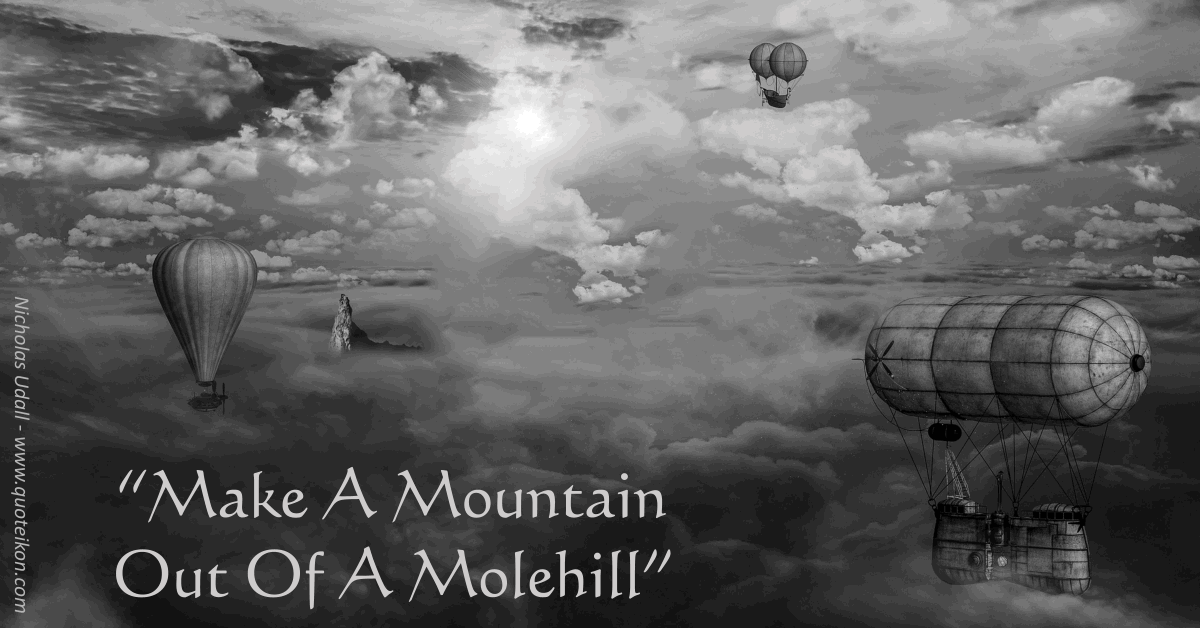
Make A Mountain Out Of A Molehill
Nicholas Udall Quote
Behold the idiom with the power to make the unimportant seem important, turn the minor into the major or reveal the insignificant as significant. The phrase is to make a mountain out of a molehill. The contrast between mountain and molehill is the basis for an alliterate metaphor that has rolled off the tongue since 1548.
Make A Mountain Out Of A Molehill Origins
The English language origin of this phrase makes an interesting story as its author was a translator with a touch of mischief.
The translator in question was an English playwright called Nicholas Udall. The book was: The First Tome or Volume of the Paraphrase of Erasmus Upon The Newe Testamente. The line in question was: The Sophistes of Grece coulde through their copiousness make an Elephant of a flye, and a mountaine of a mollehill. The year of translation was 1548.
The thing is, the line mountaine of a mollehill was not included in the book by Dutch philosopher Erasmus. The phrase Elephant of a flye was included and can be traced back to a 2nd century Greek writer named Lucian who also never became famous by comparing mountains to molehills.
The alliterative phrase was added by Udall. But, this was a translation, so what was his motive for adding this line? The mountain and molehill is a delightful upgrade from the elephant and fly, its literary aesthetic is there for all to read.
Looking deeper, perhaps there is more to this than meets the eye. Udall's services were engaged to oversee the translation by none other than Catherine Parr, the only wife who survived wedlock to King Henry VIII.
It was one year after the demise of King Henry VIII in 1547 that Nicholas Udall added the phrase make a mountain out of a molehill to the translation.
Perhaps it was a tribute to the larger than life king who had just passed. Yes, he was a king that spilled much claret via axe on block, but, it's not every century that a monarch makes himself head of the church to ensure a marriage annulment that would satisfy a religious agenda.
As a king he cut an imposing figure. He was feared and respected in equal measure. A king who made an institution seem like a molehill to the mountain he decided to climb.
The idiom make a mountain out of a molehill had made its debut, but, it was not yet in widespread use. This changed when Thomas Bacon included this figure of speech in Catechism (1563) and it began to gain in popularity, even amongst people who had never caught glimpse of either mole or molehill!
Make A Molehill Out Of A Mountain
It is also an idiom that can cut both ways with the intention of trivialising an important matter by phrasal reversal to make a molehill out of a mountain. Looking at it another way, many businesses have met bankruptcy by turning the proverbial mountain into a molehill.
Other Uses, Politics and Media
The politics of distraction is always making mountains out of molehills to channel peoples focus and energies away from important issues they would rather not be available for public consumption. Politicians are adept at acting upon the definition rather than stating the idiom.
Make a mountain out of a molehill is popular with newspaper editors who love their metaphors and alliterative rhyming verse. They also like the brevity of meaning carried with all idioms. Blowing things out of proportion is nothing new to the media who specialise in making mountains out of molehills and cutting them back down to size again for good measure.
Minor setbacks are often construed disproportionally to their merit where melodramatic magnification is the media measure of choice to sell a story.
It would seem the power of the idiom is indeed still important in many spheres of life.
![]() Article By: Michael Joseph Farrelly
Article By: Michael Joseph Farrelly
Great quotes are not where you find great wisdom. It's where you share this knowledge that counts
Sharing Is Caring
Random Mountains Quote
"Today, two big mountains lie like a dead weight on the Chinese people. One is imperialism, the other is feudalism"
- Mao Zedong










